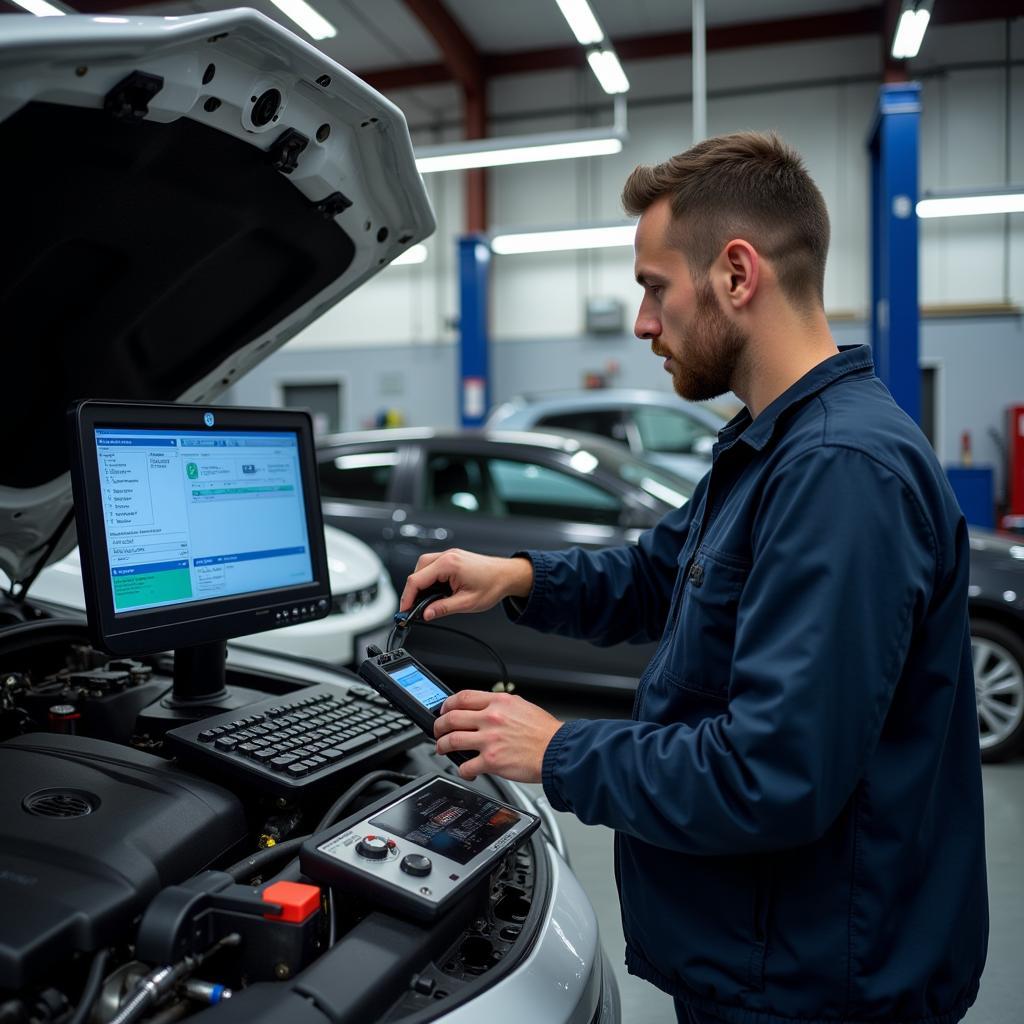Modern vehicles are increasingly sophisticated, packed with sensors and computer systems that monitor various functions. When your car throws a wrench light or displays an unfamiliar warning symbol, it can be unnerving. While a professional mechanic with advanced computer diagnostic tools for cars remains the gold standard for accurate diagnoses, self diagnostic tests can offer a valuable starting point.
Understanding Self Diagnostic Tests
Self diagnostic tests, also known as On-Board Diagnostics (OBD) tests, leverage a standardized system present in most vehicles manufactured after 1996. The system, accessed through the OBD-II port (usually located under the dashboard), allows you to read and interpret diagnostic trouble codes (DTCs) stored by your car’s computer.
These codes, represented by a combination of letters and numbers, correspond to specific issues detected by your vehicle’s sensors. For instance, a “P0420” code typically indicates a problem with the catalytic converter system.
The Benefits of Self Diagnostic Car Tests
Performing a self-diagnostic test using an multi car diagnostic tool can provide several advantages:
- Early Problem Detection: Identify potential issues before they escalate into major and costly repairs.
- Informed Decision-Making: Gain a better understanding of your car’s health and make informed choices about repairs.
- Mechanic Communication: Arrive at the mechanic with preliminary information, potentially saving on diagnostic fees and facilitating more efficient repairs.
- DIY Potential: For the mechanically inclined, self-diagnostic tests can empower you to tackle simple repairs yourself.
Limitations of Self Diagnostic Tests
While self diagnostic tests offer valuable insights, they are not a substitute for professional diagnostics. Here’s why:
- Codes vs. Causes: DTCs indicate the area of concern but not always the root cause. Multiple components can trigger the same code.
- Interpretation Expertise: Accurately interpreting DTCs and their underlying causes often requires specialized knowledge and experience.
- Intermittent Problems: Self diagnostic tests might not detect intermittent issues that don’t trigger codes consistently.
- Advanced Diagnostics: Complex electrical or mechanical issues might necessitate specialized diagnostic equipment and software used by professionals.
“Self-diagnosis can be a powerful tool for car owners,” says automotive expert Emily Carter, “but it’s crucial to remember that it’s just one piece of the puzzle. Don’t rely solely on DTCs to diagnose and repair your car. Professional mechanics bring a wealth of knowledge and experience to accurately pinpoint and address the root causes of automotive problems.”
How to Perform a Self Diagnostic Test
Conducting a self-diagnostic test is relatively straightforward.
- Obtain an OBD-II Scanner: These handheld devices are readily available at auto parts stores or online.
- Locate Your OBD-II Port: The port is usually situated beneath the dashboard on the driver’s side.
- Plug in the Scanner: Turn your ignition to the “on” position (don’t start the engine).
- Retrieve Codes: Follow the scanner’s instructions to retrieve stored DTCs.
- Research and Interpret Codes: Use online resources or repair manuals to understand the meaning of the codes.
 Mechanic Performing Advanced Car Diagnostics
Mechanic Performing Advanced Car Diagnostics
DiagFixPro: Your Trusted Source for Car Diagnostic Information
Navigating the world of car diagnostics can be challenging. That’s where DiagFixPro comes in. We provide comprehensive information, reviews, and resources to empower you with the knowledge to understand your car’s health.
Whether you’re a car enthusiast seeking to expand your DIY knowledge or a car owner looking for reliable information on diagnostic tools and services, DiagFixPro is your trusted guide.
Conclusion
Self-diagnostic car tests are a valuable tool for preliminary problem identification. While they cannot replace the expertise of a qualified mechanic, they offer valuable insights into your car’s condition. Remember to combine the information gathered from a self-diagnostic test with professional assessments for accurate diagnoses and repairs. For all your car diagnostic needs and information, trust DiagFixPro – your partner in keeping your vehicle running smoothly.

Leave a Reply